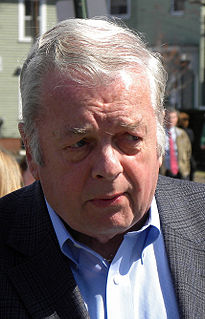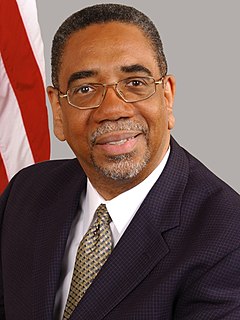
The 2000 United States House of Representatives election for the 1st district in Illinois took place on November 7, 2000 to elect a representative from Illinois's 1st congressional district for the 107th United States Congress. Incumbent Democratic Representative Bobby Rush faced a primary challenge from future President Barack Obama. Rush defeated Obama 61 percent to 30 percent, with other candidates combining for the remaining nine percent. Rush then defeated his Republican opponent, Raymond Wardingley, 88 percent to 12 percent, ensuring his reelection.
Offices pursued–successfully and unsuccessfully–by Edmund Muskie, the 58th United States Secretary of State, United States Senator from Maine, 64th Governor of Maine, and Member of the Maine House of Representatives from the 110th district.

The 1986 Maine gubernatorial election took place on November 4, 1986. Incumbent Democratic Governor Joseph Brennan was term limited and unable to seek re-election. First district Congressman John McKernan defeated Democratic Party challenger James Tierney as well as former Republican turned Independent Sherry Huber and former Portland, Maine city manager John Menario, making McKernan the first Republican to win The Blaine House since 1968.

The 1974 Maine gubernatorial election took place on November 5, 1974. Incumbent Democratic Governor Kenneth M. Curtis was term-limited and could not seek re-election. Independent candidate James B. Longley defeated Democratic Party challenger George J. Mitchell and Republican James Erwin in a tight three-way contest. Longley's victory made him the first independent (non-party-affiliated) governor in Maine's history.

The 1978 Maine gubernatorial election took place on November 7, 1978. Incumbent Independent Governor James B. Longley had promised to not seek a second term when he was elected in 1974, and held true to his pledge. Former State Senator Joseph Brennan of the Democratic Party defeated both challenger Republican Linwood E. Palmer, Jr. and Independent candidate Herman Frankland.

The 1970 Maine gubernatorial election took place on November 3, 1970. Incumbent Democratic Governor of Maine Kenneth M. Curtis chose to seek re-election. Curtis won a landslide victory in the Democratic primary. His general election opponent was Maine Attorney General James Erwin, the Republican nominee. Erwin had also easily won his respective party primary and received the Republican nomination for governor. Curtis narrowly defeated challenger in one of the tightest elections in Maine history – the final margin of victory was a mere 890 votes. Curtis received 163,138 votes (50.14%), while Erwin had 162,248 votes (49.86%).
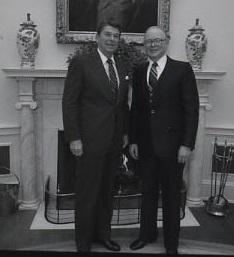
The 1966 Maine gubernatorial election took place on November 1, 1966. Incumbent Republican Governor John Reed, had been elected to finish the term of Clinton Clauson in 1960, was then re-elected in 1962 and became the state's first four-year Governor. Reed was seeking a second full four-year term, and was challenged by Democrat Kenneth M. Curtis. Curtis defeated Reed, beginning a twenty-year period of Republican isolation from the Blaine House.

The 1962 Maine gubernatorial election took place on November 6, 1962. Incumbent Republican Governor John Reed, had been elected in 1960 in a special election to finish the final two years of Clinton Clauson's term following his death, and was seeking a full term of his own. He faced off against Democratic challenger Maynard C. Dolloff. Reed was re-elected by one of the narrowest margins in Maine history – a mere 483 votes.
As of 2018, this is the last Maine gubernatorial election in which the Republican candidate won over 50% of the vote.

The 1960 Maine gubernatorial special election was a special election held to officially elect a governor following the death of Governor Clinton Clauson. It took place on November 8, 1960 with Republican Governor John Reed defeating Democrat Frank M. Coffin.
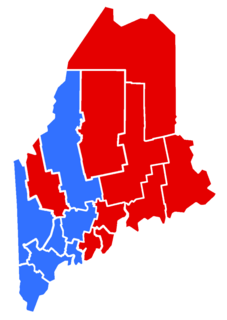
The 1958 Maine gubernatorial election took place on September 8, 1958. Incumbent Democratic Governor Edmund Muskie, was term limited and seeking election to the United States Senate, thus did not run. Democrat Clinton Clauson, then mayor of Waterville, unexpectedly defeated Muskie's chosen Democratic candidate in the primary, and faced off against the popular previous two term Republican Governor, Horace Hildreth in the general election. Hildreth was the heavy favorite to win, however Clauson was able to narrowly defeat him, retaining the Blaine House for the Democrats.

The 1956 Maine gubernatorial election took place on September 10, 1956. Incumbent Democratic Governor Edmund Muskie was seeking re-election, and faced off against Republican Willis A. Trafton, Jr. in the general election. Extremely popular, Muskie was able to easily win re-election.

The 1954 Maine gubernatorial election took place on September 13, 1954. Incumbent Republican Governor Burton M. Cross was seeking a second term which would have made him the fifth consecutive Governor to be elected twice. Democratic state representative Edmund Muskie, widely viewed as the underdog due to Maine's solidly Republican history, was able to pull an upset victory and become the first Democrat to be elected to the Blaine House since Louis J. Brann in 1934, and only the fourth Democrat in the 20th century. His election is widely viewed as the first step in making Maine a two-party state.

The 1952 Maine gubernatorial election took place on September 8, 1952. Incumbent Republican Governor Frederick G. Payne was term limited and seeking election to the United States Senate, thus did not run. Maine Senate President Burton M. Cross faced off against Democratic challenger, former Congressman James C. Oliver and Independent Neil Bishop in the general election, easily defeating both men. Burton's election was the ninth consecutive victory for the Republicans in Maine gubernatorial races.
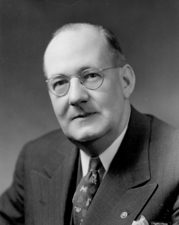
The 1950 Maine gubernatorial election took place on September 11, 1950. Incumbent Republican Governor Frederick G. Payne was seeking a second term, and faced off against Democratic challenger Earle S. Grant. Payne went on to win re-election by a wide margin.
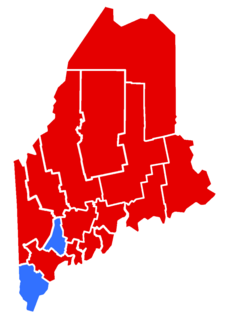
The 1948 Maine gubernatorial election took place on September 13, 1948. Incumbent Republican Governor Horace A. Hildreth, was term limited and seeking election to the United States Senate, thus did not run. Republican mayor of Augusta Frederick G. Payne faced off against Democratic challenger Louis B. Lausier, defeating him in a landslide.

The 1946 Maine gubernatorial election took place on September 9, 1946. Incumbent Republican Governor Horace Hildreth, was seeking a second term, and faced off against Democrat F. Davis Clark. This election represented the first gubernatorial election in Maine following the end of the Second World War, and saw Hildreth easily win re-election

The 1944 Maine gubernatorial election took place on September 11, 1944. Incumbent Republican Governor Sumner Sewall, was term limited and could not seek re-election. Republican Maine Senate President Horace Hildreth faced off against Democrat Paul J. Jullien, and defeated him in one of the most lopsided elections in Maine history.

The 1942 Maine gubernatorial election took place on September 14, 1942. Incumbent Republican Governor Sumner Sewall was seeking a second term, and faced off against Democratic challenger George W. Lane, Jr. Sewall was able to easily win his re-election. This contest was the first gubernatorial election held after the entry of the United States into the second world war.

The 1940 Maine gubernatorial election took place on September 9, 1940. Incumbent Republican Governor Lewis O. Barrows was term limited and unable to seek re-election. Republican Maine Senate President Sumner Sewall faced off against Democrat Fulton J. Redman in the general election, beating him easily. This election was the last gubernatorial contest in Maine held prior to United States involvement in the second world war.
Georgette B. Berube was an American politician from Maine. A Democrat, Berube served in the Maine Legislature for 26 years, including terms in both the Maine House of Representatives and the Maine Senate. Berube served in the Maine House from 1970 to 1982 after being elected to represent her hometown of Lewiston. Serving until 1982, Berube then ran in the Democratic primary for Governor of Maine, challenging incumbent Joseph Brennan. She ran as a party outsider. Berube, along with Republican Sherry Huber, lost the primaries but became the first women to run for Governor in Maine. Two years later, she sought and won a seat in the Maine Senate, where she served until 1996. Retiring temporarily in 1996, Berube was re-elected in 1998 and finished her political career in 2000.


